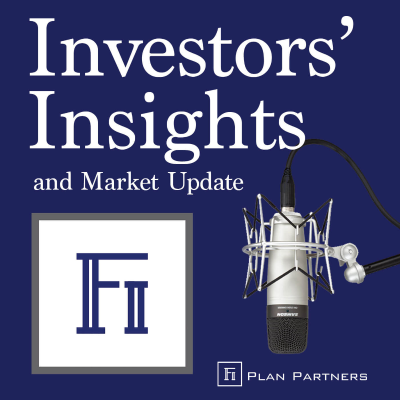
Investors' Insights and Market Updates
Podcast door Fi Plan Partners
Tijdelijke aanbieding
2 maanden voor € 1
Daarna € 9,99 / maandElk moment opzegbaar.

Meer dan 1 miljoen luisteraars
Je zult van Podimo houden en je bent niet de enige
4.7 sterren in de App Store
Over Investors' Insights and Market Updates
Investing insights on the markets and economy providing strategies designed to grow your wealth
Alle afleveringen
744 afleveringenFed Hints at Rate Cuts Federal Reserve Chairman Jerome Powell made statements last Friday that strongly hinted at a potential interest rate cut in September. This would mark the first rate cut since December 18, 2024, when the Fed reduced rates by 25 basis points. If implemented, the September cut would come after a nine-month gap, the longest pause between cuts in recent history. Historically, extended gaps between rate cuts have often signaled positive long-term outcomes for markets. However, short-term volatility remains a key concern. September and October have traditionally been challenging months for stocks, and given signs of economic slowing, the next three months could be bumpy. Despite this, historical data suggests that the S&P 500 has ended higher 12 months after similar periods nearly 91% of the time. Lower interest rates typically help stimulate economic activity and market growth, but patience and careful planning remain essential during this transition period. Consumer Prices: What to Expect Understanding where inflation may appear next is critical. Economic data like CPI (Consumer Price Index), PPI (Producer Price Index), and jobs numbers are often backward-looking. To gauge future trends, analysts have examined recent corporate earnings calls for forward-looking insights. Consumer staples, everyday essentials like soap, paper products, and food, showed a below-average number of mentions regarding price increases. This suggests that price hikes in staples are unlikely in the near term, which is good news for consumers. However, the outlook for consumer discretionary items, non-essential goods such as entertainment, apparel, and luxury items, is different. Mentions of planned price increases in this category spiked significantly, indicating that companies believe consumers may tolerate higher costs for discretionary purchases. This trend creates a unique dynamic: while everyday goods may remain stable, luxury and non-essential items could see price hikes, partially influenced by tariffs and lingering inflationary pressures. Monitoring these shifts will be critical for understanding where inflation impacts consumer wallets next. Market Moves After Powell’s Speech Leading up to Powell’s comments, markets experienced a five-day losing streak, reflecting investor uncertainty over the Fed’s stance. At the start of the week, the probability of a September rate cut stood at roughly 83%, but midweek fears of a more hawkish position pushed those odds down to nearly 55%. When Powell confirmed a willingness to cut rates and emphasized the need to support a weakening labor market, investor confidence returned. By Friday, the probability of a September cut rose back to 84–85%, and markets rallied sharply, recovering nearly half of the week’s earlier losses. Despite the overall volatility, underlying market activity revealed an important trend: the majority of weakness came from the year’s best-performing stocks, while lagging stocks saw gains. This rotation suggests that investors are repositioning portfolios rather than exiting markets altogether. The bond market echoed this sentiment. The two-year Treasury yield climbed through the week, reflecting uncertainty, before dropping after Powell’s comments signaled a dovish stance. This illustrates how closely markets are tied to Fed guidance and why investor sentiment can swing dramatically based on policy expectations. Greg Powell, CIMA® [https://fiplanpartners.com/our-team/greg-powell/] President and CEO Wealth Consultant Email Greg Powell here [gpowell@fiplanpartners.com] Bobby Norman, CFP®, AIF®, CEPA® [https://fiplanpartners.com/our-team/bobby-norman-cfp/] Managing Director Wealth Consultant Email Bobby Norman here [bnorman@fiplanpartners.com] Trey Booth, CFA®, AIF® [https://fiplanpartners.com/team-new/trey-booth-cfa-aif/] Chief Investment Officer Wealth Consultant Email Trey Booth here [tbooth@fiplanpartners.com] Ty Miller [https://fiplanpartners.com/our-team/ty-miller/], AIF® [https://fiplanpartners.com/our-team/bobby-norman-cfp/] Vice President Wealth Consultant Email Ty Miller here [tmiller@fiplanpartners.com] Fi Plan Partners is an independent investment firm in Birmingham, AL, with a team of professionals serving clients across the nation through financial planning, wealth management and business consulting. The team at Fi Plan Partners creates strategies in the best interest of their clients using fee based investing. The opinions voiced in this material are for general information only and are not intended to provide specific advice or recommendations for any individual. All performance referenced is historical and is no guarantee of future results. All indices are unmanaged and may not be invested into directly. Economic forecasts set forth in this presentation may not develop as predicted. No strategy can ensure success or protect against a loss. Stock investing involves risk including potential loss of principal. Securities and advisory services offered through LPL Financial, Member FINRA/SIPC and a registered investment advisor. The post Fed Comments, Market Response [https://fiplanpartners.com/fed-comments-market-response/] first appeared on Fi Plan Partners [https://fiplanpartners.com].
Labor Market Resilience Recent updates on inflation highlight important trends for consumers. While headline inflation remained relatively tame in July, the Producer Price Index (PPI) told a different story. The PPI for final demand, which measures average price changes received by domestic producers, showed that companies are increasingly passing cost increases along to consumers. Despite these pressures, retail sales data indicates that consumers remain willing to spend. This resilience is largely supported by the labor market, which continues to show strength. Although hiring has slowed, layoffs remain minimal. Importantly, CEO hiring forecasts have improved since April, when tariff concerns spooked employers. At that time, 39% of CEOs planned to reduce hiring; today, that number has dropped to just 21%. This matters greatly, as consumer spending fuels corporate earnings, and earnings, in turn, drive stock prices. For now, the stability of the labor market is proving strong enough to offset rising inflationary pressures. Strong Earnings Despite Tariff Pressures Second-quarter earnings, covering April through June, provide another encouraging signal. During a period filled with uncertainty around tariffs and higher input costs, many expected corporate America to struggle. Instead, the opposite occurred. Earnings expectations for the S&P 500 initially fell to $62.48 but rebounded sharply to $66.84 as companies reported results. To date, 80% of companies have reported, and nine of eleven sectors have exceeded expectations. On a year-over-year basis, earnings grew nearly 13%, a significant achievement given the challenges. This outcome demonstrates the adaptability of U.S. corporations. Many feared tariffs would serve as an excuse for disappointing results, yet companies were able to pivot and deliver stronger-than-expected performance. This innovation not only supports earnings today but also signals potential for continued growth. Since stock valuations are tied to earnings, strong earnings growth helps justify higher market levels. What some call an “expensive” market may quickly look reasonable if earnings continue to expand at current rates. Fed Policy and Rate Cut Expectations The Federal Reserve remains in focus as markets await updates from its Jackson Hole conference. At its last meeting, the Fed opted to keep rates steady, though two members dissented in favor of a rate cut. Attention now turns to whether cuts are imminent. Markets are currently pricing in about an 85% chance of a rate cut in September, down from nearly 98% after hotter than expected PPI data. The Fed has pointed to tariffs as a key driver of inflation, though this explanation remains debated. Beyond policy decisions, the composition of the Fed itself could soon change. President Trump is expected to nominate Stephen Miran to fill a vacant seat. While this would initially be a temporary role, Miran could later become a permanent member, depending on Chairman Jay Powell’s tenure. Future leadership possibilities include Kevin Warsh, Christopher Waller, or Kevin Hassett, underscoring the many moving parts in Fed decision-making. Greg Powell, CIMA® [https://fiplanpartners.com/our-team/greg-powell/] President and CEO Wealth Consultant Email Greg Powell here [gpowell@fiplanpartners.com] Bobby Norman, CFP®, AIF®, CEPA® [https://fiplanpartners.com/our-team/bobby-norman-cfp/] Managing Director Wealth Consultant Email Bobby Norman here [bnorman@fiplanpartners.com] Trey Booth, CFA®, AIF® [https://fiplanpartners.com/team-new/trey-booth-cfa-aif/] Chief Investment Officer Wealth Consultant Email Trey Booth here [tbooth@fiplanpartners.com] Ty Miller [https://fiplanpartners.com/our-team/ty-miller/], AIF® [https://fiplanpartners.com/our-team/bobby-norman-cfp/] Vice President Wealth Consultant Email Ty Miller here [tmiller@fiplanpartners.com] Fi Plan Partners is an independent investment firm in Birmingham, AL, with a team of professionals serving clients across the nation through financial planning, wealth management and business consulting. The team at Fi Plan Partners creates strategies in the best interest of their clients using fee based investing. The opinions voiced in this material are for general information only and are not intended to provide specific advice or recommendations for any individual. All performance referenced is historical and is no guarantee of future results. All indices are unmanaged and may not be invested into directly. Economic forecasts set forth in this presentation may not develop as predicted. No strategy can ensure success or protect against a loss. Stock investing involves risk including potential loss of principal. Securities and advisory services offered through LPL Financial, Member FINRA/SIPC and a registered investment advisor. The post Out-Earning Inflation [https://fiplanpartners.com/outearning-inflation/] first appeared on Fi Plan Partners [https://fiplanpartners.com].
Blended families can present unique estate planning challenges, especially when it comes to housing. Watch this week’s Educational Insights episode as Mark Hume explains how a life estate strategy, triggered by a will, could help ensure a surviving spouse has housing security while preserving the inheritance for biological children. Watch to learn more. Mark Hume, CFP® [https://fiplanpartners.com/our-team/mark-hume-cfp/] Senior Vice President Wealth Consultant Email Mark Hume here [mhume@fiplanpartners.com] Fi Plan Partners is an independent investment firm in Birmingham, AL, with a team of professionals serving clients across the nation through financial planning, wealth management and business consulting. The team at Fi Plan Partners creates strategies in the best interest of their clients using fee based investing. The opinions voiced in this material are for general information only and are not intended to provide specific advice or recommendations for any individual. All performance referenced is historical and is no guarantee of future results. All indices are unmanaged and may not be invested into directly. Economic forecasts set forth in this presentation may not develop as predicted. No strategy can ensure success or protect against a loss. Stock investing involves risk including potential loss of principal. Securities and advisory services offered through LPL Financial, Member FINRA/SIPC and a registered investment advisor. The post Life Estates [https://fiplanpartners.com/life-estates/] first appeared on Fi Plan Partners [https://fiplanpartners.com].
Outperforming Expectations in a Volatile Market Market volatility remained a dominant theme last week as investors continued to process the ongoing news around tariffs. Despite these headwinds, one critical driver of equity markets, corporate earnings, has delivered far stronger results than anticipated. As the second-quarter reporting season nears its close, with roughly 70% of S&P 500 companies having reported, earnings continue to exceed expectations. Sales growth has reached 5.6%, while blended earnings growth stands at 11.2%, well above the July 1 estimate of 5.8%. If these numbers hold, it will mark the third consecutive quarter of double-digit growth. Strong results from the technology and consumer discretionary sectors have been key contributors to this performance, driving the latest leg higher in the index’s growth rate. This momentum is particularly notable given the uncertainty surrounding tariffs. As markets head into the third quarter, attention will shift toward more normalized expectations, and investors will be watching closely to see whether earnings can continue to support valuations that many consider expensive. The AI Spending Surge Earnings season is in full swing, and four of the world’s largest technology or tech-related companies have revealed staggering levels of investment in artificial intelligence. Collectively, these firms spent $95 billion in capital expenditures this quarter on AI initiatives alone. This trend shows no signs of slowing. With the recent tax bill providing attractive incentives for capital expenditures, estimates now project these four companies will spend $364 billion this fiscal year, up 12% from the previous $325 billion estimate. For perspective, before the pandemic, $364 billion would have equaled a government stimulus package. These record-breaking investments highlight the intensity of the race to lead in AI, a theme expected to remain firmly embedded in market dynamics for years to come. Fed Uncertainty Adds to Market Shifts In addition to tariff concerns, volatility has also been fueled by uncertainty surrounding Federal Reserve policy. Recent developments suggest a period of shakeup ahead, as investors weigh the Fed’s next moves alongside shifting market expectations. Understanding how these monetary policy decisions intersect with strong earnings and historic levels of AI spending will be critical in assessing the market’s trajectory in the coming months. Greg Powell, CIMA® [https://fiplanpartners.com/our-team/greg-powell/] President and CEO Wealth Consultant Email Greg Powell here [gpowell@fiplanpartners.com] Bobby Norman, CFP®, AIF®, CEPA® [https://fiplanpartners.com/our-team/bobby-norman-cfp/] Managing Director Wealth Consultant Email Bobby Norman here [bnorman@fiplanpartners.com] Trey Booth, CFA®, AIF® [https://fiplanpartners.com/team-new/trey-booth-cfa-aif/] Chief Investment Officer Wealth Consultant Email Trey Booth here [tbooth@fiplanpartners.com] Ty Miller [https://fiplanpartners.com/our-team/ty-miller/], AIF® [https://fiplanpartners.com/our-team/bobby-norman-cfp/] Vice President Wealth Consultant Email Ty Miller here [tmiller@fiplanpartners.com] Fi Plan Partners is an independent investment firm in Birmingham, AL, with a team of professionals serving clients across the nation through financial planning, wealth management and business consulting. The team at Fi Plan Partners creates strategies in the best interest of their clients using fee based investing. The opinions voiced in this material are for general information only and are not intended to provide specific advice or recommendations for any individual. All performance referenced is historical and is no guarantee of future results. All indices are unmanaged and may not be invested into directly. Economic forecasts set forth in this presentation may not develop as predicted. No strategy can ensure success or protect against a loss. Stock investing involves risk including potential loss of principal. Securities and advisory services offered through LPL Financial, Member FINRA/SIPC and a registered investment advisor. The post Outperforming Expectations [https://fiplanpartners.com/outperforming-expectations/] first appeared on Fi Plan Partners [https://fiplanpartners.com].
Insights on Tariffs and Market Movement Last week was a heavy one for markets. As we noted earlier, there was significant potential for volatility driven by macroeconomic data, and that’s exactly what unfolded. Between a lower-than-expected GDP print, a soft jobs report, and heightened geopolitical tension around trade, the result was increased market uncertainty. The most notable downside risk stemmed from the Federal Reserve and the reluctance to commit to a September rate cut, despite mounting evidence of economic slowing and added pressure to the markets. The justification? Powell pointed to tariffs as inflationary, hence resisting a dovish stance. However, Friday’s surprisingly weak payroll report underscored the fragility of the current labor market. Only 73,000 jobs were added in the last month, well below trend, and downward revisions to May and June data added to the concern. The data package suggested the Fed may have already fallen behind, and we now expect a rate cut in September, in line with actions taken by other central banks this year. Additional cuts may follow into 2026. Looking internationally, we continue to track progress on trade agreements. Our research shows that countries securing tariff deals, highlighted in blue on our charts, are seeing stronger market outcomes than those still negotiating or holding out, highlighted in red. While last week’s events were challenging, it’s important to keep perspective. August is historically volatile with typically lower returns. However, fundamentals like credit conditions remain supportive. For example, initial jobless claims held steady at 218,000, indicating there’s no widespread employment breakdown. Moreover, recent U.S. tax reform and continued deregulation could support business activity moving forward. Fed Signals and Consumer Spending Building on those insights, the Federal Reserve’s position is worth a closer look. For the first time since 1993, two members of the Fed openly dissented from the policy decision, noting that rates should have been cut immediately. This level of disagreement is rare, especially given the Fed’s typically unified voice. The dissent highlights increasing tension and possible indecision within the Fed itself, as well as growing external pressure from figures like President Trump, who has been vocal about his dissatisfaction with Jerome Powell. Additionally, a Fed member recently resigned before the end of her term, adding another layer of uncertainty. Turning to GDP, the headline 3% real growth for Q2 was strong. However, beneath the surface, the numbers tell a more nuanced story. Consumer spending, which accounts for about 70% of GDP, remained solid, which is a positive signal for economic momentum. In Q1, businesses rushed to import goods before new tariffs kicked in. This front-loading inflated trade activity early in the year. By Q2, the effects faded, and net exports emerged as a stronger contributor to growth simply because the importing slowed down, not because of increased trade efficiency. In short, the volatility in trade numbers over the past two quarters has masked the underlying trends. We expect Q3 GDP to offer a clearer baseline of what’s truly happening in the economy post-tariffs. All eyes will be on the Fed’s Jackson Hole meeting and the upcoming September decision. These will be pivotal moments as policymakers evaluate whether to shift course amid mixed signals across jobs, growth, and inflation data. Greg Powell, CIMA® [https://fiplanpartners.com/our-team/greg-powell/] President and CEO Wealth Consultant Email Greg Powell here [gpowell@fiplanpartners.com] Bobby Norman, CFP®, AIF®, CEPA® [https://fiplanpartners.com/our-team/bobby-norman-cfp/] Managing Director Wealth Consultant Email Bobby Norman here [bnorman@fiplanpartners.com] Trey Booth, CFA®, AIF® [https://fiplanpartners.com/team-new/trey-booth-cfa-aif/] Chief Investment Officer Wealth Consultant Email Trey Booth here [tbooth@fiplanpartners.com] Ty Miller [https://fiplanpartners.com/our-team/ty-miller/], AIF® [https://fiplanpartners.com/our-team/bobby-norman-cfp/] Vice President Wealth Consultant Email Ty Miller here [tmiller@fiplanpartners.com] Fi Plan Partners is an independent investment firm in Birmingham, AL, with a team of professionals serving clients across the nation through financial planning, wealth management and business consulting. The team at Fi Plan Partners creates strategies in the best interest of their clients using fee based investing. The opinions voiced in this material are for general information only and are not intended to provide specific advice or recommendations for any individual. All performance referenced is historical and is no guarantee of future results. All indices are unmanaged and may not be invested into directly. Economic forecasts set forth in this presentation may not develop as predicted. No strategy can ensure success or protect against a loss. Stock investing involves risk including potential loss of principal. Securities and advisory services offered through LPL Financial, Member FINRA/SIPC and a registered investment advisor. The post Decisions and Deadlines [https://fiplanpartners.com/decisions-and-deadlines/] first appeared on Fi Plan Partners [https://fiplanpartners.com].

4.7 sterren in de App Store
Tijdelijke aanbieding
2 maanden voor € 1
Daarna € 9,99 / maandElk moment opzegbaar.
Exclusieve podcasts
Advertentievrij
Gratis podcasts
Luisterboeken
20 uur / maand

































